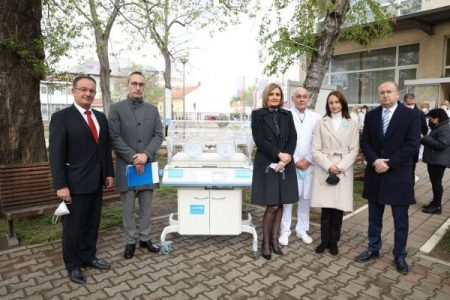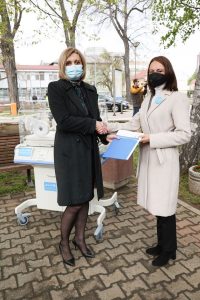
Novi Sad, April 15, 2021 – Under auspices of a nationwide UNICEF campaign called “So small they could fit inside a heart“, which was launched last year with the aim of equipping and modernizing neonatal units in Serbia, the city of Novi Sad is now has a new incubator. Deyana Kostadinova, Director of UNICEF Serbia, handed the incubator over to the Director of the Institute for Health Protection of Children and Youth of Vojvodina, docent Dr Jelena Antić in the presence of the State Secretary at the Ministry of Health, Professor Ferenc Vicko, MD, Provincial Secretary of Health, Professor Zoran Gojković, MD, and a representative of the companies Boja Sombor and Vojput, Goran Janković, who donated funds for the purchase of incubators in Novi Sad.
“In previous years, the Institute for Health Protection of Children and Youth of Vojvodina has already received a neonatal ventilator, as well as important equipment and support aimed at preserving family-oriented developmental care for premature babies. The support we have received from UNICEF is enormous, and that assistance is primarily used in boosting our capacities, as well as through the professional support we receive, the very strong commitment of experts and the tireless struggle to bring development care to the highest standards. Even in such difficult times, UNICEF has always been our reliable partner that we can always count on,” said the Institute’s director, docent Dr. Jelena Antić.
65,000 children are born in Serbia every year, of which 4,000 are born prematurely, and every day, seven new babies require some kind of urgent care. Premature birth is responsible for more than 60% of infant deaths.
Thanks to the cooperation with leading national experts in the field of neonatology, in the period from 2017 to date, UNICEF has defined a number of measures for supporting intensive neonatal care units in eight hospitals in Niš, Kragujevac, Belgrade and Novi Sad. Following the outbreak of the COVID-19 pandemic, UNICEF also provided 12 neonatal ventilators for the intensive care of premature babies in these facilities. Since 2017, UNICEF has invested a total of 36,928,892.00 dinars in the modernization of the neonatal care in Serbia.
“Premature babies are fighting for their lives since the very moment of their birth. In order to provide them with the best possible conditions, we need to continue working on improving neonatal units and boosting the capacities of doctors who provide support to these babies without whom they would not survive. At the same time, we must create conditions, despite the pandemic, where constant contact between parents and the newborn is nurtured, which is crucial for their emotional connection and thus for the growth and development of the child. I would like to thank everyone who responded to our appeal and who, with their donations, helped us to continue to raise the standards of neonatal intensive care units by providing equipment – a cause on which UNICEF has been working on since 2017 in cooperation with the Ministry of Health. I would like to invite others to join us, because solidarity and togetherness are the best answer to everything we have to face in times of great challenges,” said director of UNICEF Serbia, Deyana Kostadinova.
The Ministry of Health of the Republic of Serbia has also supported the ‘So small they could fit inside a heart’ campaign. Since 2017, the Ministry and UNICEF have been cooperating a lot on improving neonatal care in Serbia.
“UNICEF is an important partner and supporting the modernization of neonatal care in Serbia is one of the priorities we have been working on since 2017. This support is especially important during the pandemic, because babies and children must receive the best care regardless of the circumstances. We would like to thank UNICEF and everyone who donated funds, because only together can we respond to all challenges and ensure that these sensitive babies get the best possible conditions at the beginning of their lives, “said State Secretary at the Ministry of Health, Professor Ferenc Vicko, MD.
“UNICEF is an important partner to us with whom we have been cooperating in numerous areas. However, the health and development of children must remain a priority in all contexts – including the ongoing pandemic. I must say that UNICEF has remained committed to improving the work of perinatal, and especially neonatal care this year and last. During the first wave of the pandemic in 2020, UNICEF provided 12 neonatology ventilators and today it is giving away 4 incubators – one in Novi Sad and Kragujevac, and two in Niš which will arrive today. We are very grateful for such support,” said the Provincial Health Secretary, Professor Zoran Gojković, MD. Thanks to 4,992 individuals and 161 companies responding to the appeal, in the period from November 2020 to date, UNICEF collected more than 10 million dinars for the purchase opf four incubators that have been delivered today to Novi Sad and Kragujevac, while two incubators will go to Niš. One device for therapeutic hypothermia of newborns is intended for the Institute of Neonatology in Belgrade, and two resuscitation tables will be delivered to Kragujevac in June.
“Boja Sombor and Vojput have donated funds for the procurement of incubators, because we and UNICEF are working together to gather companies and partners around a common goal. When that goal entails providing support to premature babies so that they get a chance to live, then I am absolutely sure that we made a good decision. I am also confident that we will continue our cooperation in other areas too,” said Goran Janković, director of the companies Boja Sombor and Vojput, which donated funds for the purchase of an incubator in Novi Sad.
UNICEF will continue to procure the necessary equipment and support neonatal intensive care units in their effort to meet European standards. This includes implementing the principles of family-oriented developmental care as a vital step towards improving outcomes in terms of mortality, disease and development of children born prematurely and with health complications.
Premature babies also need support even after leaving the hospital, because they have a higher risk of lagging in development and having learning difficulties. Therefore, engagement and work with families to facilitate early recognition of developmental delays and timely intervention are most important for the health and future of children, especially for those born prematurely.
UNICEF would like to appeal to individuals and the business community to continue helping with their donations, in order to show the strength of unity and ensure the best possible conditions for the most sensitive babies at the beginning of their life.